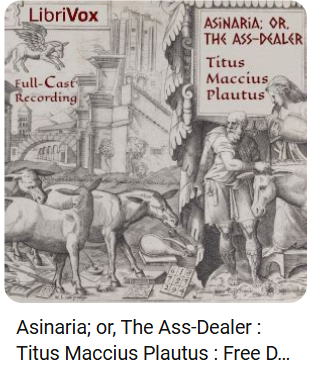Neuer Text
Apuleius Unbridled
Professor Sonia Sabnis reads The Golden Ass with a fresh eye.
By Bill Donahue | June 1, 2013
So this dude named Lucius fools around with magic and (check it out, yo!) turns himself into a donkey. As he wanders through the boondocks, he keeps hearing weird stories—a randy witch who transforms men into animals, thieves who try to sell a young bride to a brothel, a frog that jumps out of a dog’s mouth. Lucius finally turns back into a man, only to be completely duped by this goofy religious cult, which suckers Homeboy out of all the cash lining his sorry pockets.
........
When she presented a paper at the 2011 meeting of the American Philological Association, she took issue with the stodgy archaisms that abound in The Golden Ass translations used by today’s college students—“verily,” for instance, and “forsooth.” In that paper, she celebrates the “innovation of Apuleius’s language in combination with the colloquialism and humor of his storytelling.” She zeroes in on one of Apuleius’s favorite adverbs, prorsus, which, despite more than two millennia of Latin scholarship, still eludes definition. Sabnis suggested that prorsus might be compared to the pause word “like” popularized by, like, you know, Valley Girls. She shows how both John Arthur Hanson, the Princeton professor behind a popular 1989 translation, and she herself render one sentence uttered by a young nobleman, Tlepolemus, who, disguised as a bandit, voices a boast to a band of thieves. The sentence is “totamque prorsus deuastaui Macedoniam.”
She shows how both John Arthur Hanson, the Princeton professor behind a popular 1989 translation, and she herself render one sentence uttered by a young nobleman, Tlepolemus, who, disguised as a bandit, voices a boast to a band of thieves. The sentence is “totamque prorsus deuastaui Macedoniam.”
Hanson: “I laid waste the whole of Macedonia.”
Sabnis: “I wasted like all of Macedonia.”
Sabnis points out that the English word “like” is an intensifier used to lay extra stress on what follows—and argues that the word fits in Tlepolemus’s mouth because he is “trying to ingratiate himself to a robber band by mimicking the solemn heroization and amplification that they use when describing their feats of banditry on the margins of society.” Dude’s trying to sound like he’s got some street, in other words; he’s trying to fit in.
So i can start it is Plautue aseria The comedy od asses. you need several. nd we its about the reality and about the satire we call it in German "Realsatire". we have to start the kive of Plplautus .

maccius plautus thus writes about slave traders, who, however, were not slave traders in ancient Rome, but donkey traders. These former humans no longer have human rights, but only the right of an animal. In contrast to the normal donkey, these donkeys speak and important ! sing.. But how do the ass of a Donkyrealy look.

When she presented a paper at the 2011 meeting of the American Philological Association, she took issue with the stodgy archaisms that abound in The Golden Ass translations used by today’s college students—“verily,” for instance, and “forsooth.” In that paper, she celebrates the “innovation of Apuleius’s language in combination with the colloquialism and humor of his storytelling.” She zeroes in on one of Apuleius’s favorite adverbs, prorsus, which, despite more than two millennia of Latin scholarship, still eludes definition. Sabnis suggested that prorsus might be compared to the pause word “like” popularized by, like, you know, Valley Girls. She shows how both John Arthur Hanson, the Princeton professor behind a popular 1989 translation, and she herself render one sentence uttered by a young nobleman, Tlepolemus, who, disguised as a bandit, voices a boast to a band of thieves. The sentence is “totamque prorsus deuastaui Macedoniam.”
The Golden Ass (or, to use the book’s Latin name, The Metamorphoses) has made frequent appearances in Humanities 110 since at least 1990 and will return to the syllabus in spring 2014. “The book has a lot of intellectual depth,” explains professor Wally Englert [classics 1981–]. “It references the ancient Egyptians, and it references Plato and Virgil. It’s a great way to end the course—in The Golden Ass, students can see reflections of the earlier things they’ve read.”









